11 Best Confluence AI Search Alternatives in 2026
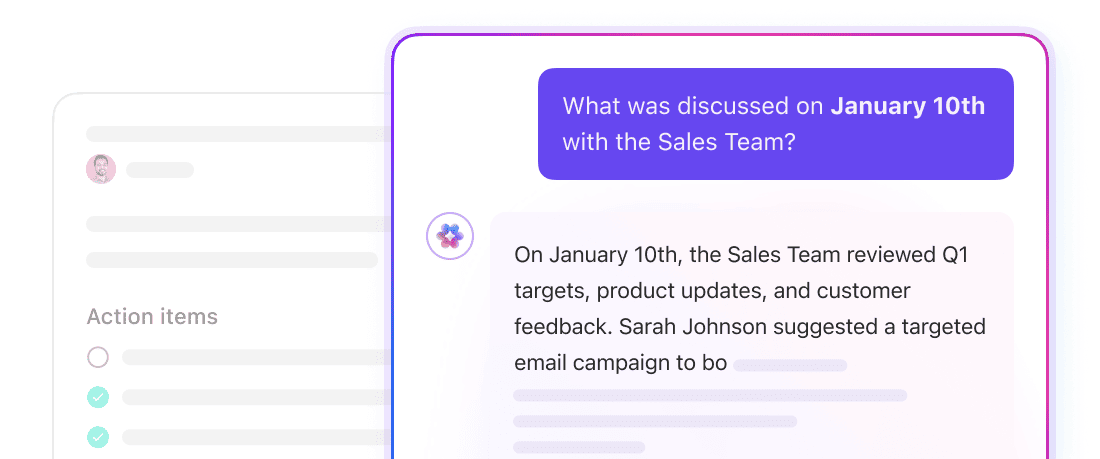
Sorry, there were no results found for “”
Sorry, there were no results found for “”
Sorry, there were no results found for “”

You type in a keyword, hit enter, and brace yourself: irrelevant results about some project from three years ago.
That’s the reality many teams face when using Confluence’s AI search. For knowledge managers and IT teams tasked with making information easy to find, that kind of friction slows everything down.
That’s why more teams are actively exploring Confluence AI Search Alternatives. These tools go beyond surface-level search and actually help you surface meaningful content when it counts.
Let’s look at a few. 🧰
Here’s a glimpse of what these Confluence AI search alternatives are best at:
| Tool | Best for | Best features | Pricing |
| ClickUp | All-in-one productivity with custom views and workflows Team size: Individuals, mid-market companies, enterprises | ClickUp Brain (connected AI assistant), Connected Search, Docs, knowledge base, real-time collaboration, task templates, dashboards | Free; paid plans available with customization for enterprises |
| Slite | Lightweight knowledge sharing for remote and async teams Team size: Small to mid-sized distributed teams | AI documentation assistant, collaborative editing, topic channels, version history | Paid plans starting at $10/month per user |
| Guru | Real-time internal knowledge base with browser access Team size: Sales, support, and ops teams | AI card suggestions, Chrome extension, Slack integration, knowledge verification workflows | Free; paid plans starting at $25/month per user |
| Glean | Unified AI search across internal tools Team size: Mid to large enterprises | Federated search, AI summarization, personalized recommendations, permissions-aware indexing | Custom pricing |
| Notion AI | Unified docs, task tracking, and AI writing help Team size: Individuals, creators, startup teams | AI summarizer, writing suggestions, databases + docs, 20,000+ templates, Enterprise Search | Free trial available; paid plans starting at $12/month per user |
| Bloomfire | Secure, searchable knowledge sharing with analytics Team size: Mid-sized businesses and enterprise teams | AI-powered search, analytics, content scoring, rich media support | Custom pricing |
| Elastic Search | Scalable enterprise search and analytics platform Team size: IT and dev teams needing robust search | Full-text PDF search, real-time analytics, custom indexing, scalability for large data volumes | Custom pricing |
| Document360 | Technical documentation and internal knowledge bases Team size: IT professionals and knowledge managers | Category manager, version control, private hosting, advanced search, analytics | Custom pricing |
| Nuclino | Lightweight, fast team collaboration and knowledge sharing Team size: Small teams and startups | Real-time collaborative docs, internal wiki, graph view, markdown support | Free; paid plans starting at $8/month per user |
| Quip | Collaborative documents and spreadsheets inside Salesforce Team size: Sales and customer-facing teams | Live collaborative editing, chat inside docs, task lists, seamless integration capabilities with Salesforce | Paid plans starting at $12/month per user |
| Algolia | Lightning-fast AI search with custom ranking and filtering Team size: Developers and product teams | AI re-ranking, typo tolerance, dynamic filters, federated content search | Custom pricing |
Our editorial team follows a transparent, research-backed, and vendor-neutral process, so you can trust that our recommendations are based on real product value.
Here’s a detailed rundown of how we review software at ClickUp.
Let’s explore why you might want to consider Confluence AI Search alternatives:
🔍 Did You Know? The global AI in knowledge management market size is projected to reach $62.4 billion by 2033. This exhibits a compound annual growth rate of 25% during the forecast period.
Here are the top 11 Confluence AI Search alternatives. ⚒️
If you’ve ever wished your work tools could think a little more like your team, ClickUp might be the closest thing to that wish granted.
It’s the world’s first converged AI workspace that combines project management, documents, and team communication, all in one platform—accelerated by next-generation AI automation and search.
Instead of digging through folders or pinging someone on Slack for updates, you can just turn to ClickUp Knowledge Management.
Of course, what powers it behind the scenes is ClickUp Brain. This AI add-on is wired directly into how your team works.
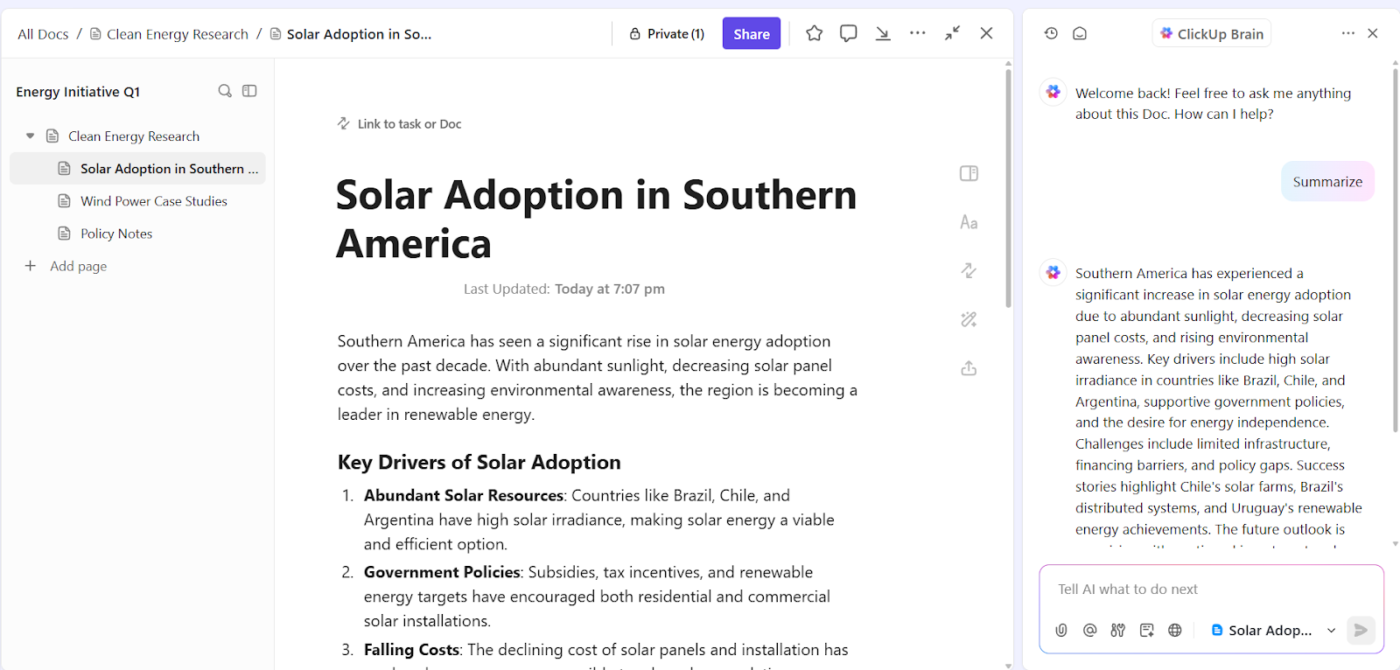
Need a quick summary of a project that’s been going on for three months? It can scan documents, tasks, updates, and comments to provide a clean, actionable recap. Building a product launch plan? ClickUp Brain can suggest milestones, write copy drafts, and generate weekly update reports, all in seconds.
It can even search the web for you, compile findings, and create a report within ClickUp!
Then there’s ClickUp Enterprise Search, the tool’s way of ensuring you never have to think, ‘Where did I see that again?’
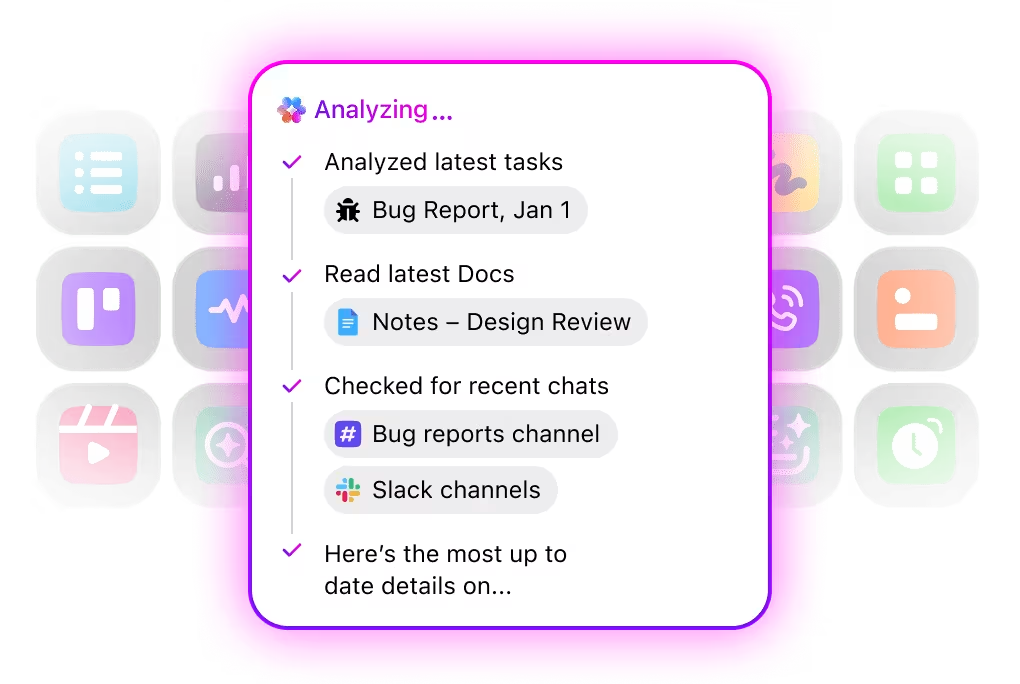
It doesn’t matter where your file is—ClickUp, Jira, or Google Drive—you can search across all of it in one go. Maybe your sales team wants to find the latest pricing sheet, or your dev team needs a spec doc hidden in a sea of Slack threads. Just type in what you’re looking for, and the intranet search engine pulls it up with AI-powered context.
ClickUp Docs is where you build your information.
With Docs, you can turn ideas into action in real-time. For instance, your marketing team is drafting a campaign proposal. As they write, they embed ClickUp Task Checklists with due dates, link to campaign tasks, and even pull in a live kanban board of the project timeline, all within the same doc.
And since Docs are collaborative, your entire team can create wikis, comment, edit, and move things forward together, whether you’re drafting a product roadmap or documenting onboarding SOPs.
Your knowledge comes alive in ClickUp, literally. Its suite of AI agents, ranging from answer agents to the Brain agent, can instantly look through workspace documents or connected apps and provide answers to queries across chat channels and tasks. Yes, you no longer need to answer the same question 10 times.
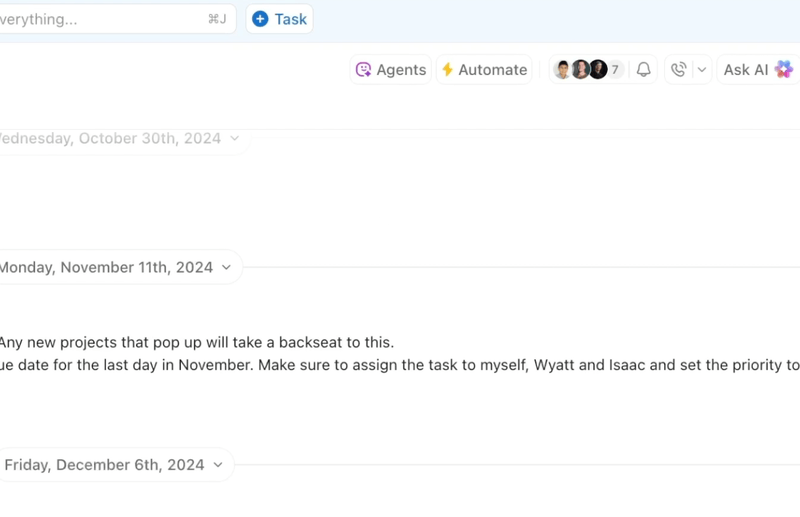
💟 AI Search: ClickUp offers an all-in-one AI layer. Enterprise Search uses AI to index and search across both ClickUp content (tasks, docs, comments) and 1,000+ external apps (Jira, Google Drive, Slack) in one query. ClickUp Brain then uses this context to provide actionable summaries and answers grounded in project context, eliminating the need for manual digging or switching between apps. It also features AI Agents that automatically answer repetitive questions across chat channels.
Here’s a firsthand perspective:
ClickUp is the most detailed, and yet the most flexible, platform I’ve ever encountered for task lists and collaboration. There are so many ways to create lists and track projects. It has given my team a simple way to keep up-to-date on all our client work, communicate with one another on specific tasks, and store all of our shared knowledge and resources. We’ve hardly even scratched the surface of what it can do, and yet it has done so much to help us stay organized and get everything done.
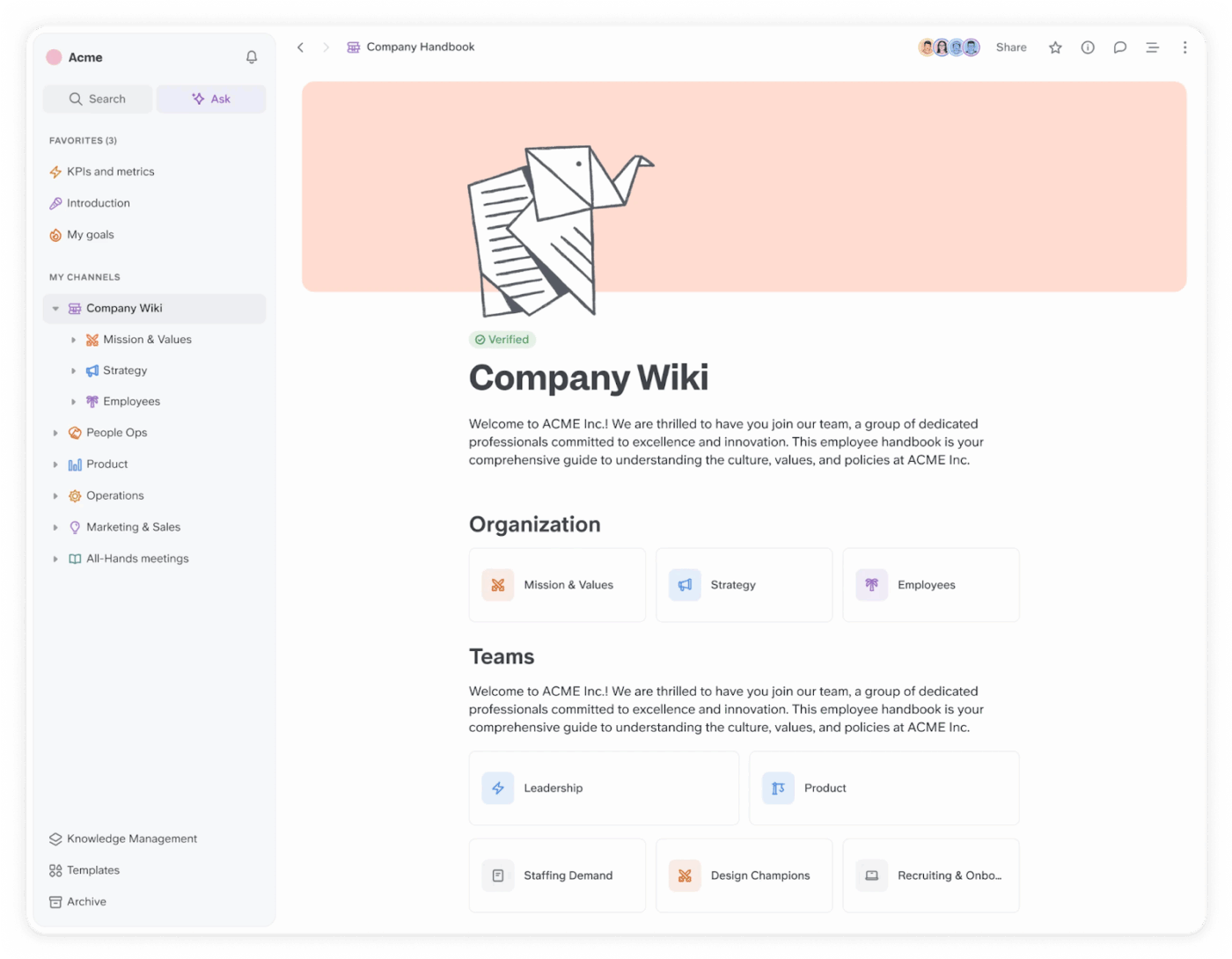
Slite is a structured knowledge base that helps IT professionals centralize documentation, processes, and internal FAQs without clutter. Its AI-powered search pulls up relevant pages, discussions, and past decisions, making it easier to locate technical details quickly, especially in fast-moving environments.
Slite’s clean UI, version control, and real-time collaboration features support ongoing updates to infrastructure documentation, onboarding guides, and troubleshooting SOPs. For teams managing complex tech stacks, the tool also reduces siloed knowledge by keeping discussions and decisions tied to documents, not lost in chats.
💟 AI Search: Slite’s AI-powered search is designed to let you “talk to your knowledge base” using natural language (like ChatGPT). It goes beyond simple keyword matching to understand the meaning and context of your questions. The tool also uses AI to continuously organize content, spotting duplicates, suggesting relevant document links, and ensuring the documentation remains current and trusted.
This is how one user described their experience:
All is very simple! Your tool is very intuitive. If you used another tool like Notion, as I was, you won’t lost. And if you don’t use this kind of tool, you will learn very quickly to use it. It was very easy to import my Notion into my Slite…I would like to see more features for roadmap, like a gantt model. Also, when I imported some Notion of different users, the layout are not exactly the same, so I needed to spend some times to improve it.
📮 ClickUp Insight: Monday blues? Turns out Monday stands out as a weak link in weekly productivity (pun unintended), with 35% of workers identifying it as their least productive day. This slump can be attributed to the time and energy spent hunting for updates and weekly priorities on Monday mornings.
An everything app for work, like ClickUp, can help you here. For instance, ClickUp Brain, ClickUp’s built-in AI assistant, can ‘catch you up’ on all critical updates and priorities in seconds. And, everything you need for work, including integrated apps, is searchable with ClickUp’s Connected Search. With ClickUp’s Knowledge Management, building a shared point of reference for your organization is easy! 💁

Guru is a real-time knowledge management software that helps knowledge managers capture, organize, and distribute information without interrupting workflows. Unlike Confluence, which often requires switching contexts through nested pages, it surfaces verified information directly within the apps teams already use.
Cards (Guru’s core content units) are easy to update, assign for verification, and track for usage, giving knowledge managers visibility into what’s helping and what’s outdated. Its AI-powered search and suggestions make it easier to deliver accurate answers in fast-paced customer support or sales environments.
💟 AI Search: Guru focuses on delivering verified, context-rich answers directly into the user’s workflow via a browser extension (Chrome, Slack, MS Teams). The AI performs Agentic Search—retrieving, reasoning, and responding—instead of just listing documents.
One review puts it this way:
Our internal support team’s knowledge base is being organized with Guru’s guidance. In addition to helping them with their workflow, it gives them the knowledge and confidence to trust the solutions they find…When the dots are obscured by an arrow, making it difficult to see what you’re looking for unless you click the corresponding drop-down arrow, which then reveals everything you were looking for, things get more complicated.
💡 Pro Tip: Start prompts with a specific role to guide the response tone and scope. For instance, say ‘You’re a senior project manager’ to get structured, high-level answers.
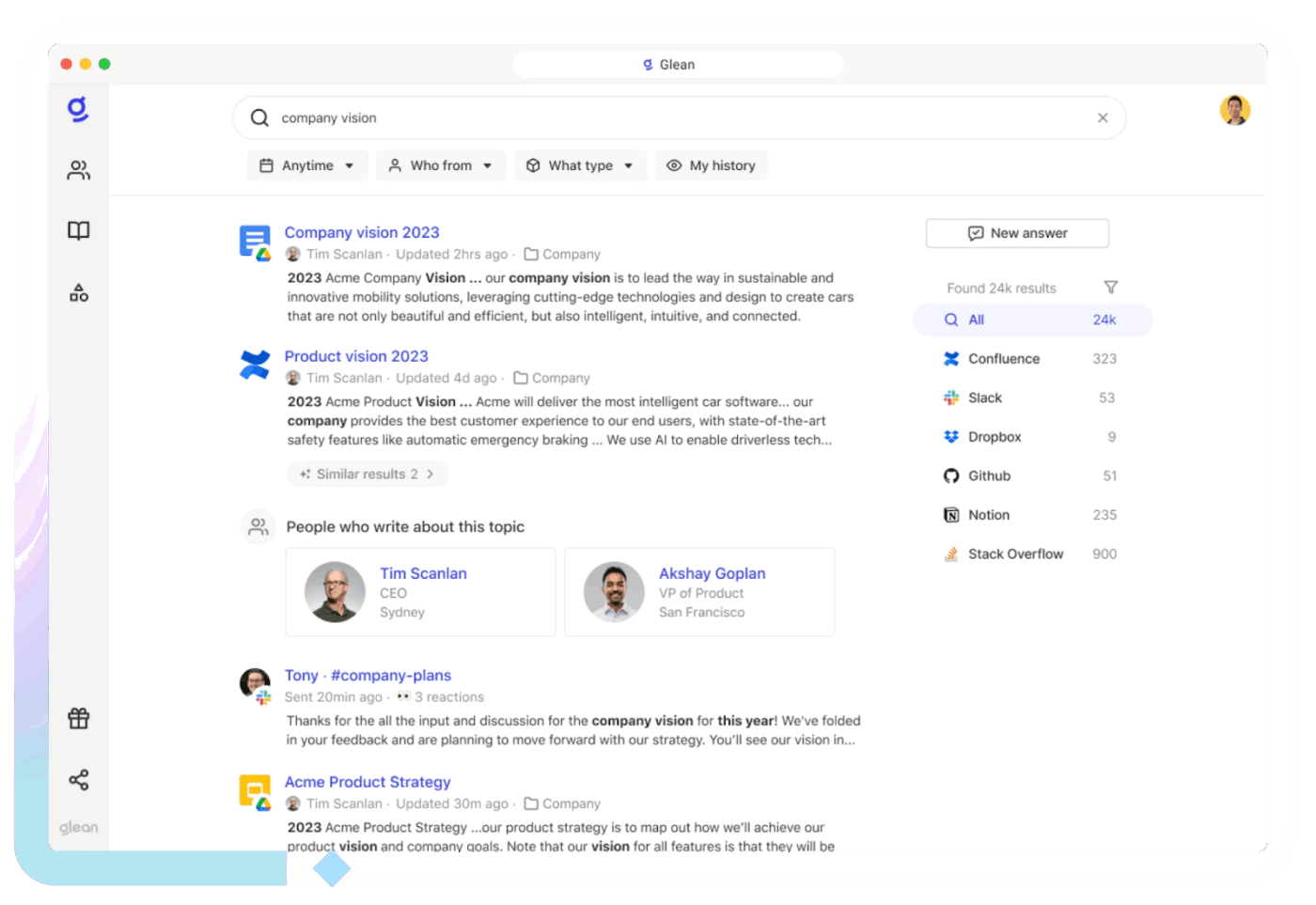
Want to search data beyond internal content? Glean is an enterprise search platform that lets IT professionals quickly locate information across a sprawling tech stack.
Its AI understands natural language queries and organizational context, delivering personalized, permission-aware results. This is particularly useful for IT teams handling onboarding, troubleshooting, or compliance documentation.
💟 AI Search: Glean creates a secure, comprehensive knowledge graph across an organization’s entire sprawl of apps (Slack, Jira, Box, etc.). Its AI understands the user’s current project and security clearance, delivering hyper-personalized, cross-platform answers that make information access feel native and immediate, regardless of the source silo.
A quick snippet from a real user:
The overall focus of Glean is more accutely focused on the user ‘get in and get done’, recognizing that search is not a destination, but a means to what the user really wants… the answer…Search would be improved with greater sorting capabilities, right now relevance (which is not clear to the user) is the main factor but it would be a relative easy addition to allow users to SORT BY date (Z-A or A-Z)…People, while hooked to identity management lacks some flexibility in manual overrides to deal with some user situations with off shore, contractors etc leading to some odd results or missing context

Struggling with inconsistent documentation within Notion? Notion AI extends the tool’s functionality with its intelligent writing and intelligent search capabilities. Compared to standalone AI tools or search engines, Notion AI works natively within content blocks, allowing users to ask questions, auto-complete thoughts, or rewrite content based on tone or clarity.
Its AI Autofill feature helps populate database fields more quickly, while Q&A enables semantic search across multiple pages. Compared to tools like Confluence AI or Guru, Notion AI focuses less on indexing external systems and more on optimizing internal workflows. It also translates text directly within Notion, making collaboration across languages effortless.
💟 AI Search: Notion AI allows users to query data within complex databases and linked pages, receiving citable, summarized answers rather than just a list of documents. Its AI writing and autofill functions streamline content creation, ensuring the knowledge is built and shared via a consistent format from the start.
According to one reviewer:
Notion AI has transformed how our Sales team finds, summarizes, and leverages content. What used to take hours—like digging through 300-slide decks or multiple repositories—is now done in minutes. Its ability to search across both Notion and Google Drive (without uploading anything manually!) is a superpower for our company…We’d love deeper integrations-especially with Gong. While there’s a potential workaround via API, a native one-click connection would be ideal.
🤝 Friendly Reminder: Use formatting instructions to control the structure of the response. For instance, say ‘Summarize in three bullets, then list two blockers, and one recommendation.’

IT teams are often overwhelmed with repeated questions. Bloomfire flips the script on traditional knowledge management. Its AI dives deep into documents, videos, transcripts, and even audio to surface answers in context.
The tool learns what your team searches for, highlights gaps, and lets anyone, from help desk to sysadmin, contribute in real time. With built-in Q&A, auto-tagging, and analytics that show what content’s working (and what’s not), Bloomfire helps IT teams reduce ticket volume, onboard faster, and finally get ahead of recurring issues.
💟 AI Search: Bloomfire’s AI excels at deeply analyzing and indexing rich media—including the transcripts of video and audio content—to find embedded knowledge often missed by standard search engines. It utilizes robust analytics to map user inquiry patterns, identifying and prioritizing the creation of knowledge to fill gaps in documentation that have been discovered.
A user shared this feedback:
It transposes videos, provides full text search, allows for different groups to be created, user analysis so we know if we are getting our money’s worth for the tool…I wish I could edit docs in the tool. But there are few cons that we have found at this point in time.
📣 The ClickUp Callout: Brain MAX is your AI-powered desktop companion that takes search to the next level. With deep integration across your documents, emails, tasks, and connected apps, Brain MAX delivers lightning-fast, context-aware search results—no matter where your information lives.
You can use natural language or talk-to-text to ask questions or find files, and Brain MAX leverages multiple leading AI models to understand your intent, surface the most relevant answers, and even summarize complex information. Whether you’re tracking down a contract, pulling up meeting notes, or searching for project updates, Brain MAX makes finding what you need effortless and intelligent.

Elastic is a scalable search and analytics platform that helps enterprises unify knowledge across tools and teams. While Confluence AI is tied to the Atlassian ecosystem, Elastic integrates with various data sources like emails, documents, databases, and support platforms.
The platform supports granular permissions, custom ranking, and advanced filtering, making it easier to manage large volumes of content securely. Elastic also offers flexible deployment options (on-prem or cloud), which is valuable for organizations with strict compliance or data residency requirements.
💟 AI Search: Elastic uses advanced Hybrid Search (combining semantic vector search with traditional keyword search) to process and rank massive, real-time datasets with granular control. This allows technical teams to build highly customized relevance models for complex, high-volume data streams (logs, metrics, and documents).
Here’s a firsthand perspective:
The search results are very fast and I like the facets feature. I used it over a million records of the database containing employee info and it took milliseconds to search them…It can be pretty complex to set it up. cost of setting it up can be pretty high. I remember hosting it up in one of my past companies and costing was mor ethan 10k
💡 Pro Tip: You can use conditional prompts to surface decision paths. For instance, ‘Suggest recovery actions if the task is behind schedule. If not, propose optimizations.’
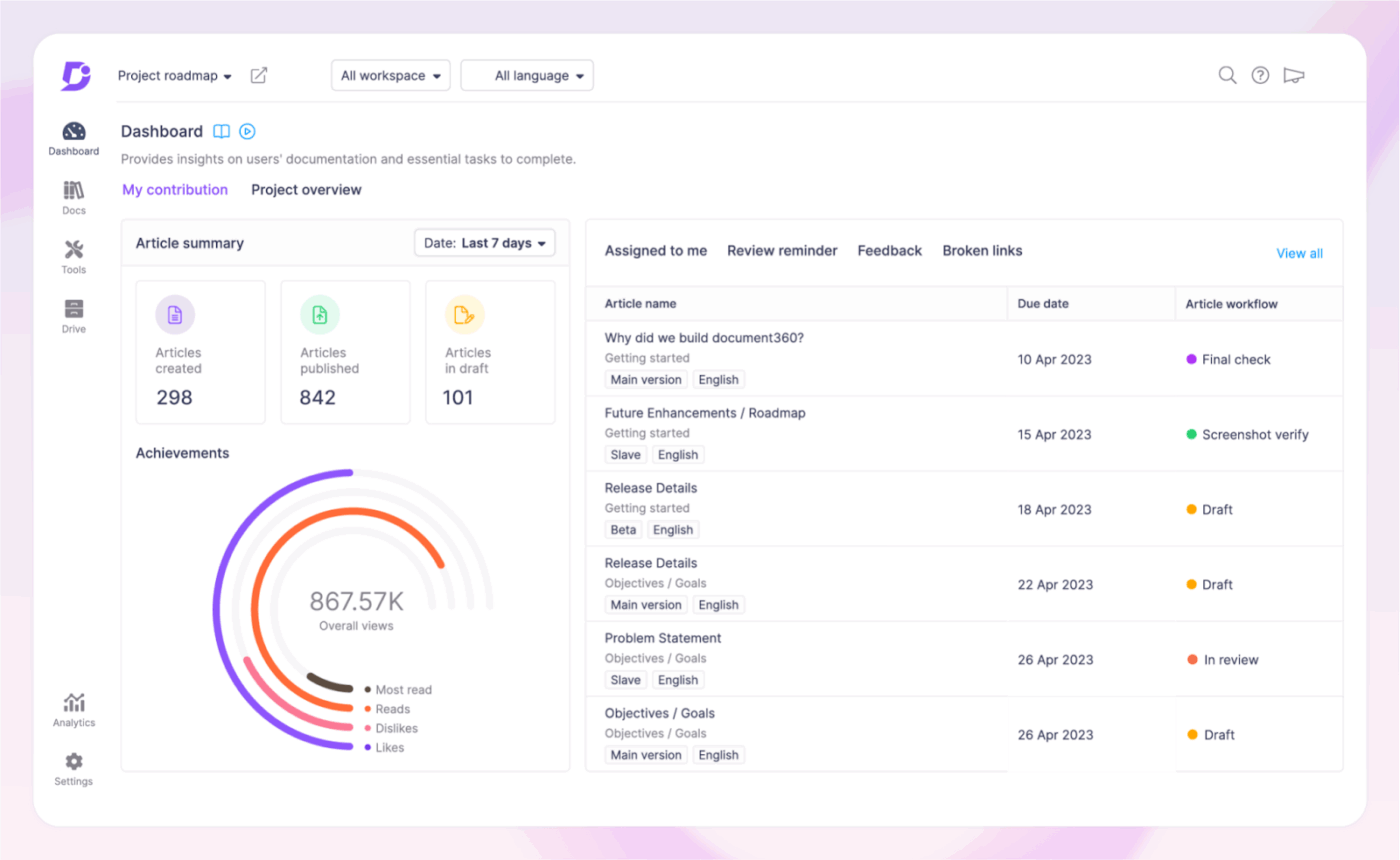
Designed with clarity, Document360 lets knowledge managers organize content through well-defined categories, versioning, and workflows, without heavy customization. Its scoped search prioritizes precision, helping teams find relevant pages fast.
Features such as advanced search filters, AI-powered search ranking, and real-time analytics help surface relevant information more quickly. Built-in version control, tagging systems, markdown support, and article history tracking also help teams maintain consistency and accountability.
💟 AI Search: Built specifically for technical writers, Document360’s search prioritizes precision and structure. The AI search is layered over a rigorously managed system, ensuring that the most technically accurate and authorized version of any SOP or guide is always returned first, minimizing error in critical processes.
See what this reviewer had to say:
Very easy and intuitive tool for KB Gives complete ownership to writers to manage the end-to-end workflow of documentation Inbuilt image and table styles make work much easier SEO and Analytics give broader understanding of how to design KB… Inflexible home page editor Introduction of span styles on copy-paste Junk characters with periods, quotes, etc. Difficulty in working with callouts Unavailability of preview or staging for intermediate check or review
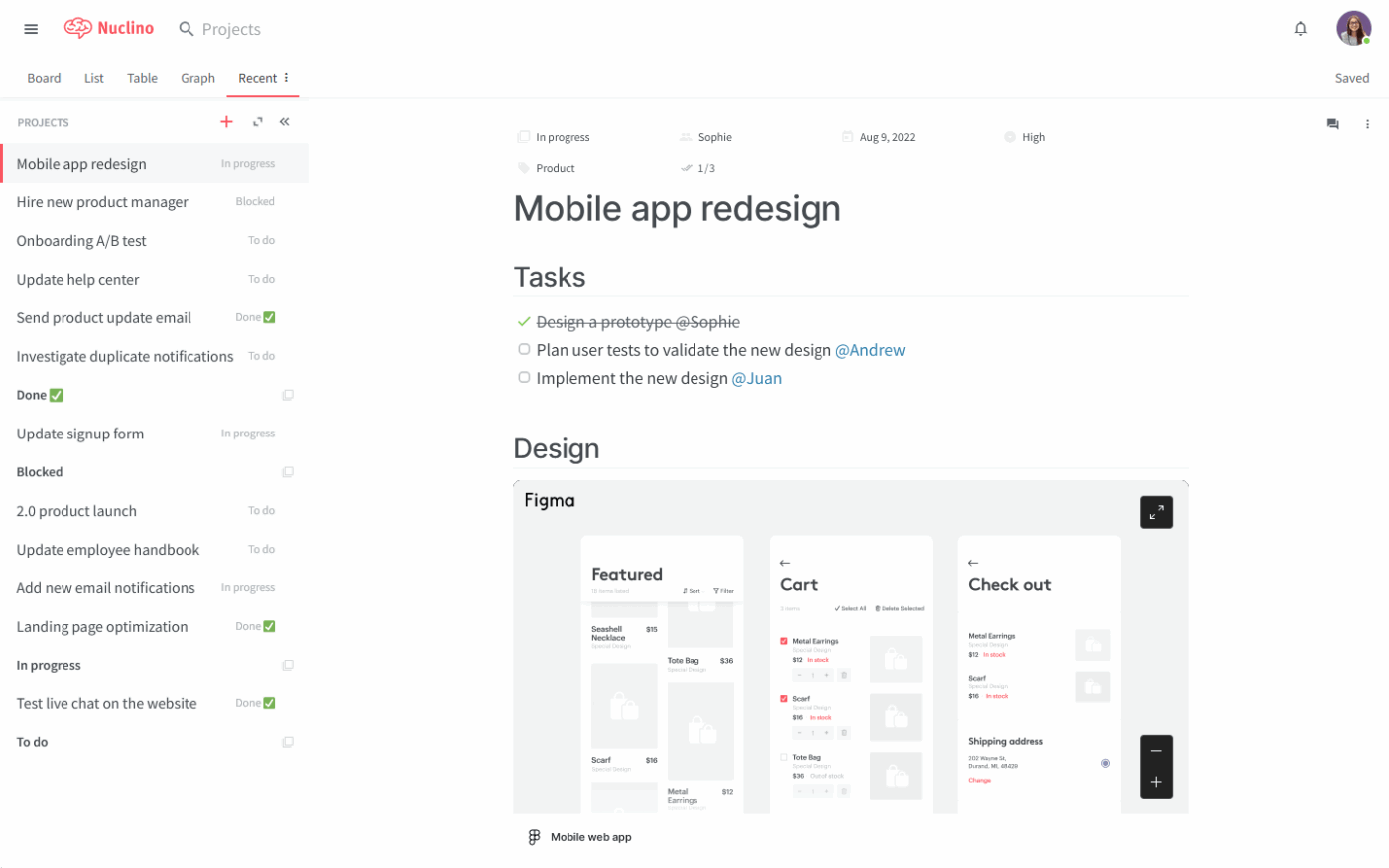
Nuclino is a solid choice for teams that want a faster, more lightweight alternative to Confluence’s bulky interface. It combines documentation, internal wikis, and project collaboration in one place without overwhelming users.
The platform uses a real-time collaborative editor, linked pages, and a graph-based structure. If your team values speed, simplicity, and clarity over complexity, Nuclino makes it easier to stay focused and find what you need without distractions.
💟 AI Search: Nuclino’s AI assistant, Sidekick, provides instant, direct answers derived from the connected internal wiki pages. The AI tool rapidly surfaces simple, clear answers, making it ideal for startups and small teams who prioritize simplicity over deep feature complexity.
Straight from a G2 review:
Very intuitive, very is to link pages together and create groups, and there are multiple good interfaces for seamlessly navigating between groups and pages…When you create a collection, it creates a page you can’t edit, which only has links to and the names of all the pages in the group, which doesn’t look very good as a page. It would be better if that were a page that could be edited to function as that collection’s home page.
🤝 Friendly Reminder: Break complex requests into a series of smaller, linked prompts. Ask for a task summary first, then follow up with a risk request, and then take the next steps.

Quip offers a more fluid and document-first experience for knowledge managers who need a simpler, more collaborative platform. It combines docs, spreadsheets, and team chat into one workspace. Quip supports inline conversations, real-time editing, and collaborative checklists, making it easier to capture, discuss, and refine knowledge as it’s created.
While it doesn’t rely heavily on AI, its simplicity and tight Salesforce integration (for those who need it) help centralize important processes and updates.
💟 AI Search: Quip’s AI capabilities are centered on its deep integration within Salesforce workflows. The search focuses on retrieving real-time business data embedded within collaborative documents and spreadsheets, ensuring that the knowledge found is directly relevant to the CRM records and live sales or service context.
This is how one user described their experience:
In order to make reference to external services or data in Quip, you may simply type a @ symbol before their handle. The @ symbol has many uses, such as mentioning people or adding a time stamp or date. In addition, you will receive a reminder at the specified time…Setting up Quip and getting the most out of it can be challenging; the optimum use is in conjunction with the Salesforce product, so you’re limited if you’re using a different CRM.

Algolia lets you fine-tune how search works across your internal tools and docs.
You get full control over things like ranking rules, real-time indexing, and even semantic re-ranking, ideal if your team manages large, complex datasets.
The platform handles faceted navigation, typo tolerance, and multi-language support out of the box. And since it’s API-first, integrating it into your stack is straightforward. It’s especially useful when you need a search that’s not just smart, but also scalable.
💟 AI Search: Algolia provides an API-first platform offering developers unprecedented control over search logic. Its AI Re-ranking feature allows for real-time adjustments to relevance scores based on user behavior and intent, creating a highly customized, super-fast front-end search experience that can handle complex filtering and multi-language support seamlessly.
One review puts it this way:
Good UI, fast integration, comprehensive documentation, multiple platforms support. Great search engine in general…Limited query logic. especially “A OR (B AND C) OR (D AND E) ” is not supported. Proper Array of object filtering on multiple fields is not supported. You need to created multiple records with the same asset and unique objects in each record form the array. Query suggestion does not help in our case. as its basically the “most popular terms” for today. Some terms can be valid now but not on the next day.
If you’ve made it through all 11 best Confluence alternatives, one thing is probably clear: you’re not just looking for any AI search.
ClickUp, the everything app for work, is the solution. With key features like ClickUp Brain for intelligent suggestions and Connected Search to cut through content silos with its advanced search capabilities.
Docs gives you seamless company knowledge sharing and collaboration tools and built-in Knowledge Management to keep everything organized with a user-friendly interface; it’s more than an alternative.
Sign up to ClickUp for free today! ✅
© 2026 ClickUp